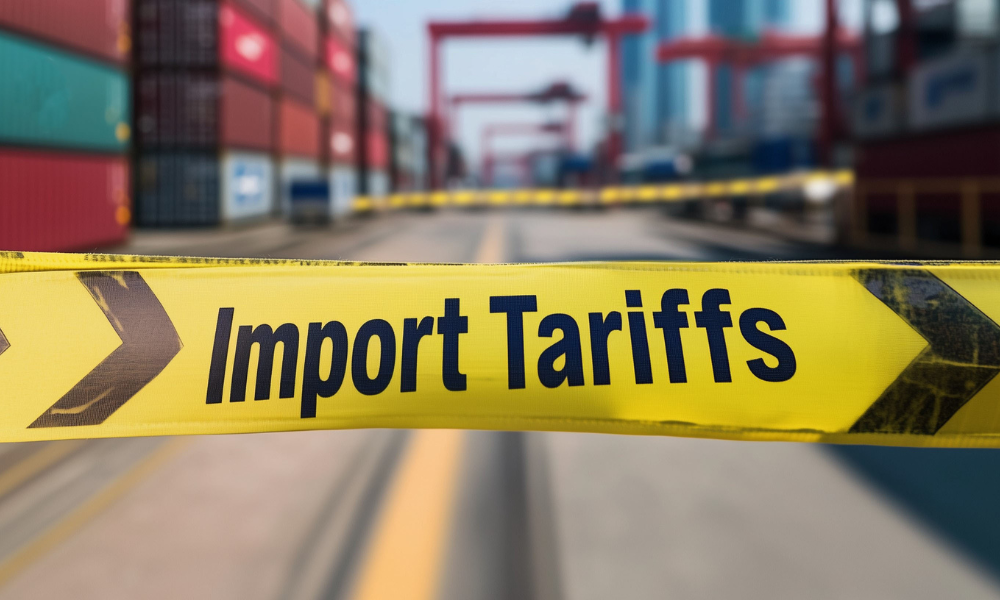New 35% US tariff on Canadian goods set for August 1 as Carney, Trump trade talks reach critical stage

A 35 percent tariff on Canadian goods is set to take effect August 1, as US President Donald Trump links trade penalties to fentanyl and dairy disputes, pushing talks with Prime Minister Mark Carney toward a volatile deadline.
According to CBC, Trump made the threat in a letter to Carney posted Thursday on Truth Social, stating “there will be no tariff if Canada, or companies within your country, decide to manufacture product within the United States.”
Trump warned that any retaliatory action would result in an increase to the 35 percent tariff.
The letter arrives just days ahead of a self-imposed July 21 deadline for a trade resolution, which both countries agreed to during the G7 Summit in Alberta last month.
As reported by BNN Bloomberg, the letter said tariffs “may be modified, upward or downward, depending on our relationship with Your Country.”
In the letter, Trump tied the tariffs to Canada’s handling of fentanyl, the trade deficit, and the supply management system.
“If Canada works with me to stop the flow of Fentanyl, we will, perhaps, consider an adjustment to this letter,” he stated.
The move follows earlier US tariffs targeting Canadian steel, aluminum, and autos, as reported by BBC, with specific levies of 25 percent on non-CUSMA-compliant goods and 10 percent on energy and potash.
According to CNN, the US has also implemented global 50 percent tariffs on steel and aluminum and 25 percent on imported cars and car parts, affecting key Canadian sectors.
Ottawa responded by investing $1.3bn in border security and appointing a fentanyl czar, following Trump’s accusations that Canada failed to stop the drug’s flow into the US.
However, The Manhattan Institute found in a July 1 report that only one percent of fentanyl pill seizures happen at the northern border.
US Customs and Border Patrol data cited by BBC shows just 0.2 percent of fentanyl seizures occur at the Canadian border.
In response to the latest threat, Conservative Leader Pierre Poilievre posted on X calling the tariff “unjustified” and urged unity: “Conservatives stand ready to do everything we can to secure the best deal for Canada by the July 21 deadline.”
The latest tariff threats are another unjustified attack on Canada’s economy.
— Pierre Poilievre (@PierrePoilievre) July 11, 2025
Canada has long been a reliable partner and trusted friend to the United States.
These tariffs will damage both our countries.
All Canadians must come together to defend our economy.
Conservatives…
Foreign Affairs Minister Anita Anand, speaking Thursday from Malaysia during the ASEAN summit, said “we are still hopeful that an agreement can be achieved,” as reported by CBC.
She added that the government is putting its full effort into the deal, calling it necessary for the health of the economy.
Canada exported $413bn in goods to the US last year, including $9.3bn in copper and copper-based products, with 52 percent destined for US markets, as per federal data cited by CBC.
Trump has also proposed a 50 percent tariff on copper starting in August.
The trade deadline now appears uncertain.
As reported by CTV via BNN Bloomberg, former ambassador to the US David MacNaughton said Thursday that the July 21 target was “not realistic at the present moment.”
US Ambassador Pete Hoekstra also refused to commit to the date, saying the eventual deal would be “good” for both countries.
In late June, Carney dropped a proposed digital services tax days before it was to take effect. According to BBC, Trump had labelled the tax a “blatant attack” and paused trade talks over it.
Carney later said the removal was “part of a bigger negotiation.”
Trump’s letter to Canada was one of more than 20 such letters sent to US trading partners, including Brazil, South Korea, Sri Lanka and others, according to CNN.
He has indicated that tariffs on these countries will also begin August 1 unless agreements are reached.



